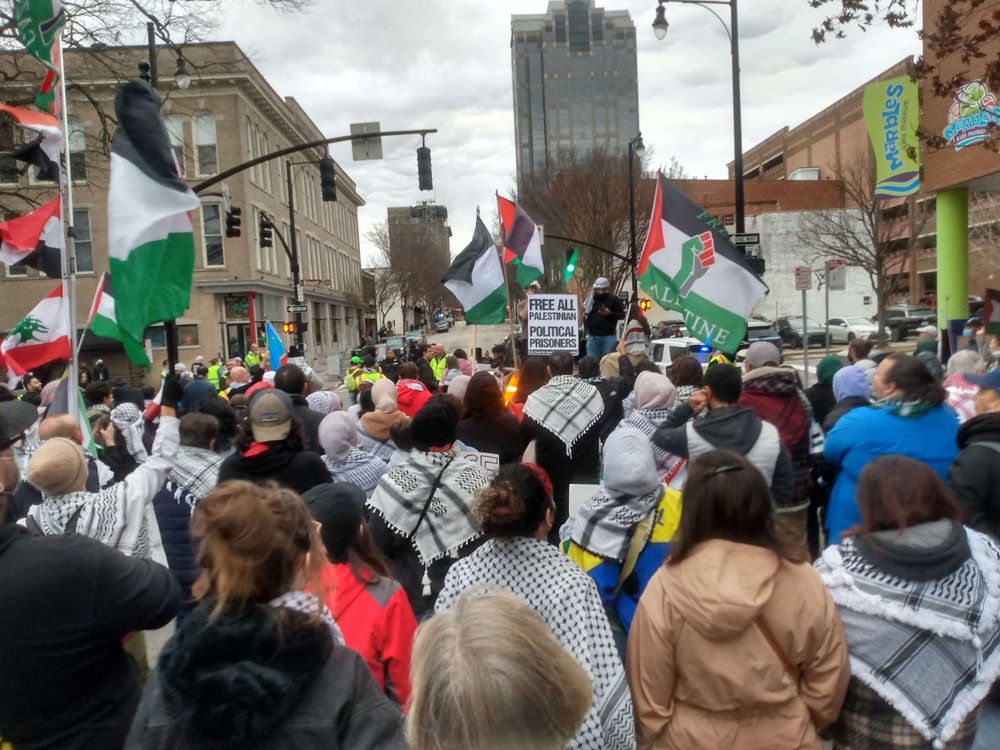

2025-2026 NPEC Applications are open
The National Political Committee is looking for nominees to serve on the National Political Education Committee from May 2025 through April 2026! As the DSA committee charged with providing a socialist political education to its members and the public, NPEC welcomes members with substantial roots in diverse areas of DSA, across a range of organizing and education experience. We also ask that chapters and official national committees, working groups, and caucuses to submit nominations.
Applicants should be prepared to devote 8 hours a month to committee business, though those with less availability will still be considered. Applicants should also be prepared to contribute to substantive discussion on the content of political education material as well as partake in its implementation. This implementation can occur across (but is not limited to) any of NPEC’s four standing subcommittees:
- Chapter Support, which holds regular workshops to support local political education programs, develop DSA members’ skill base, and connect chapters with experienced mentors
- Events and Speakers, which hosts national political education events year-round on basic socialist ideas and critical issues
- Curriculum, which develops an expanding library of ready-to-use political education materials
- Communications, which broadcasts and furthers our committee’s work through social media, our podcast, and our newsletter, Red Letter
Chapters, national committees and working groups, and caucus steering committees (or equivalent) must email their nominee’s contact information (name, email address, and phone number) to politicaleducation@dsacommittees.org by 3/24. All DSA members interested in joining NPEC, whether nominated by a DSA body or applying as an individual, must apply via this form by Monday, April 6th. Appointments by the NPC will be announced by 4/30 to begin their terms on 5/1.
If you have any questions or concerns, feel free to reach out to the Political Education Committee at politicaleducation@dsacommittees.org, reach us on the DSA forums, or RSVP here to join us for an online information session on Sunday, March 16th 2-3pm PT/5-6pm ET



One of Them Days and the Return of the Working Class Comedy
By Henry McKeand

In the everchanging movie landscape of the past decade, one of the great casualties has been the wide-release R-rated comedy. In the 2000s, raunchy joke-a-minute projects were being made with big stars for less than $50 million and reliably turning a profit at the box office, but there was a shift in the industry around a decade ago. Suddenly, studios were afraid to take a risk on releases that didn’t have superhero spectacle or franchise potential, and mid-budget films began to face an uphill battle at the cineplex. Comedy moved to television and the internet, while lighthearted fare in movies was relegated mostly to direct-to-streaming leftovers and throwaway gags in larger blockbusters.
This is part of what makes One of Them Days, Lawrence Lamont’s new comedy starring Keke Palmer and SZA as friends on a Los Angeles odyssey to recover their rent money, such a breath of fresh air. It’s a capital-C comedy with a back-to-basics buddy dynamic and modest budget (around $14 million), relying on a funny trailer and the strength of its stars to drive audiences to the theater. There’s an old-school appeal here that has already made it successful with critics and audiences, but the real highlight is the working class core of the narrative. When was the last time you watched a crowd-pleaser where the main dramatic question was whether or not the main characters would be evicted?
Palmer plays Dreux, an ambitious young woman working as a waitress at a small diner who has an important corporate interview coming up in the afternoon. SZA plays Alyssa, a talented artist with a laid back demeanor and “candles and crystals” sensibility. While Dreux has a plan for everything, Alyssa goes with the flow and believes that the spirits of their ancestors will guide them through anything life has in store. But when Alyssa’s do-nothing boyfriend Keshawn runs off with their rent money, they’re forced to work as a team and race against the clock to get their money back before their landlord kicks them out, contending with various local oddballs, criminals, and love interests along the way.
The ticking clock, escalating insanity, and “best friends” bickering call to mind countless comedies from yesteryear, from House Party to Superbad, but the best reference point may be the original Friday. Syreeta Singleton’s script shares not only a working class LA milieu with the F. Gary Gray and Ice Cube classic, but also a similar blend of social realism and class clown silliness. The best Black comedies of the 90s and 2000s, such as Friday and The Wood, served as more socially conscious alternatives to their “white yuppie in crisis” peers, and One of Them Days is no different. Whereas the few big-budget comedies of the past ten years have either been absurdist romps disconnected from reality (Bottoms, Barb and Star go to Vista Del Mar) or Hangover-esque tales of well-off middle class characters cutting loose (Booksmart, Ricky Stanicky), Lamont and Singleton focus on the daily problems that Black and working class people face.
More so than the gangsters and bullies who stand in Dreux and Alyssa’s way (here, Friday’s Deebo is swapped out for a take-no-shit neighborhood woman nicknamed “Big Booty Berniece”), the true villain is the capitalist, white supremacist world that they live in. Their ceiling is falling apart, but their landlord hasn’t fixed it. When they get their first white neighbor (Euphoria’s Maude Apatow) as a result of ongoing gentrification, they’re shocked that her unit has a working AC. In order to whip up some quick money, their only obvious options are trying to donate at a blood bank and applying for predatory loans. And when they end up en route to the hospital after one of them is electrocuted, they decide to escape from the ambulance because they can’t afford the medical bill.
Things aren’t all bleak, though. This is a film that understands the power of friendship and solidarity in the face of oppressive systems. The various neighbors argue and isolate themselves just like everyday people, but they also come together and stand up for one another as tenants and members of a shared community. And while Dreux and Alyssa have their differences, the script never forces conflict between them. For all of her flakiness, Alyssa is refreshingly supportive in her support for Dreux, and SZA, in her first major acting role, captures the character’s eccentricities and contradictions remarkably well. Palmer, too, is predictably great; her movie star charisma has been evident for years, and she is routinely hilarious as Dreux. Together, they create a lived-in quality to their characters’ friendship that’s authentic and warm.
It doesn’t hurt that this is the funniest feature-length script in years, never afraid to balance sweet human touches with comedic big swings. One scene, involving the blood bank and Abbott Elementary’s Janelle James as an irresponsible nurse, is one of the most laugh-out-loud things to grace the big screen in a long time. There’s also no shortage of perfect cameos, including Lil Rel Howery as a sneaker obsessive and Katt Williams as a sidewalk truth teller named Lucky. But the biggest standouts are the lesser-known names, such as Patrick Cage as Dreux’s mysterious crush and Joshua Neal as Keshawn. Neal, especially, embodies an all-too-real kind of unambitious, manipulative boyfriend with hilarious conviction.
Movies like One of Them Days are often classified by Hollywood as “minor” or “low stakes.” There’s no high-concept twist or massive energy beam threatening to destroy the world. These kinds of “low stakes” movies, however, are the ones that capture the actual joys and stresses of modern life. Take, for example, the scene where Dreux has her interview and has to prove herself to a white hiring manager who doesn’t know how to pronounce her name. The sequence is overflowing with emotion and humor and suspense, and it’s all rooted in something “mundane.”
At one point, as Dreux is talking to a neighbor who has been evicted and is worried about where he’ll go next, she says four simple words: “Your life is lifing.” It’s an acknowledgement that day-to-day existence is far too urgent and scary for the majority of us. One of Them Days isn’t a radical film, or at least it shouldn’t be. It’s not a vitriolic call to action or an openly socialist film. But by honing in on these kinds of mundane, material realities, it stands out from the endless stream of studio releases that are completely disconnected from working class concerns.
Films are powerful in their ability to reflect and influence public opinion, and the success of One of Them Days points to a growing dissatisfaction with capitalism. The contradictions and stresses in our everyday lives have gotten to a point where audiences are ready for stories that take stands landlords and the healthcare system. Slowly but surely, the needle is moving.
If your life is lifing right now, and you want to fight for a world in which people don’t have to struggle in order to have simple necessities, then the time is now to get involved with groups like Triangle DSA and Triangle Tenant Union!


GMDSA’s Socialist Voter Guide for Town Meeting Day 2025
Welcome to another Town Meeting Day.
Last year, Champlain Valley DSA’s Burlington-focused voter guide lamented the brevity of the Queen City’s ballot following Democratic city councilors’ unusual refusal to allow voters to consider a citizens’ initiative condemning Israeli apartheid, even though more than 1,700 residents had signed the organizers’ petition. And now, the same thing has happened again.
One question, six towns (or more)
This time around, however, activists didn’t limit their efforts to Burlington. The Apartheid-Free Community pledge – drafted originally by the American Friends Service Committee – will appear on ballots in Winooski, Vergennes, Montpelier, Brattleboro, Newfane, and Thetford. Hearteningly, as it turns out, the Burlington Democrats’ contempt for democracy may be unique within Vermont; across the state, other city councils and select boards have determined to let the people have their say.
Coincidentally, Champlain Valley DSA no longer exists: Green Mountain DSA – a new chapter of the Democratic Socialists of America seeking to represent all of Vermont (or, at least, all but the sliver belonging to our Windsor County comrades in Upper Valley DSA) – has replaced it. On our first Town Meeting Day, we endorse the Apartheid-Free Community pledge in every municipality whose ballot contains it.
The text is the same in all six places. Vote yes on Article 5 in Winooski, Article 7 in Vergennes, Article 13 in Montpelier, Article 2 in Brattleboro, Article 38 in Newfane, and Article 23 in Thetford. Please tell your friends, or you can send them this video or this op-ed written by GMDSA’s co-chair for the Times-Argus.
On behalf of the Shelburne Progressive Town Committee, a member of Green Mountain DSA also plans to propose the Apartheid-Free Community pledge from the floor at Shelburne’s Town Meeting Day, along with a resolution advocating for healthcare reform. GMDSA endorses this effort as well. If you’re planning to attend an in-person town meeting where you live, consider doing the same thing!
Winooski
Due to a procedural error last time around, Winooski must vote again on its Just Cause Eviction charter change, which passed by a huge margin in 2023. You can learn more about Just Cause Eviction, a policy that protects renters, here.
Municipal charter changes must travel through the statehouse. Burlington, Essex, and Montpelier passed Just Cause Eviction in 2021, 2023, and 2024, respectively, but none of them has won permission to implement it. And with the Vermont General Assembly trending rightward, its immediate prospects don’t look good.
But tenants will keep fighting, and someday the tenants will win. GMDSA endorses Just Cause Eviction. Vote yes on Article 4 in Winooski.
Randolph
The Orange County town of Randolph has 4,774 residents. At that size, one might expect it not to have a police force. Jericho, Georgia, and Waterbury are all larger than Randolph, and none of them employ police officers.
Yet Randolph does have its own police department, and that police department has requested a budget of $820,937 for fiscal year 2026. Including generous supplements from the town’s American Rescue Plan Act allocation, spending has grown rapidly since fiscal year 2022, when the town paid just $343,960 for law enforcement services.
The Randolph Police Department serves the Randolph Police District, not the entire municipality. The residents of the Police District, specifically, must therefore approve or reject the police budget as an independent article rather than as a component of the townwide vote on Randolph’s annual general fund expenditure. As a result, they have a chance to say no to this particular form of municipal spending without saying no to the rest.
Like many other parts of Vermont, Randolph appears recently to have begun moving toward austerity. The Orange Southwest School District has proposed cutting $1.1 million from its new budget in order to avoid property tax increases in Randolph, Brookfield, and Braintree. Yet the Randolph Police Department has bet that the growing cheapskate attitude that has emerged out of Vermont’s cost-of-living problem will make an exception for expensive policing.
We hope they’re wrong. GMDSA endorses a “no” vote on Article 5 in Randolph. It won’t abolish the police, but it’ll send Randolph’s bloated cop budget back to the drawing board.
Candidates
The membership of Green Mountain DSA did not vote to endorse any candidates for public office on Town Meeting Day this year. But our Electoral Working Group recommends the 17-candidate slate endorsed by the Vermont Progressive Party.
We’re especially pleased to see Progressives in Windham, Lamoille, and Addison counties running for select board and school board positions. In Burlington, East District and South District candidates Kathy Olwell and Jennifer Monroe Zakaras both face competition for open seats.
Victories in those races would give Progressives a majority on the Burlington City Council. Burlington’s ballot also includes a critical vote on a $152 million bond for improved wastewater and stormwater infrastructure, upon which plans for new housing depend – we recommend a yes on Question 3.
School budgets
Taking a hint from the stronger-than-usual showing for Vermont Republicans in November’s legislative elections, school districts have aimed to head off an anticipated taxpayer revolt on Town Meeting Day by slashing their budgets preemptively. Hundreds of school employees will lose their jobs, but that may not be enough to satisfy voters in some towns.
In 2024, Vermonters shot down about a third of the school budgets across the state, forcing cuts that hurt students, teachers, and families alike. This year, we recommend voting yes on every school budget.
Town Meeting Day is Tuesday, March 4, 2025. Please email us at hello@greenmountaindsa.org if you’d like to join a canvass between now and then (here’s one option), or if you’d like to see an item on your town’s ballot included in this guide.
You can check your voter registration here.


County Passes Some Eviction Protections in Response to Wildfires + Mayor Fires LAFD Chief
Thorn West: Issue No. 226
City Politics
- As many criticize the city’s lack of wildfire preparedness in advance of the Santa Ana winds, Mayor Karen Bass has today fired LAFD chief Kristin Crowley. The LA Times covers the firing in the context of a “sense of disarray that has enveloped City Hall.”
- Children’s Hospital Los Angeles stopped offering several forms of gender-affirming care, in response to a Trump administration executive order threatening the funding of any medical institution that provided this care to transgendered youths. The hospital has now partially reversed that decision, following weekly protests.
Housing Rights
- The LA City Council postponed voting on a motion that would offer eviction protections to Angelenos economically impacted by the wildfires. It will revisit the issue in March. A similar measure did pass at the County Board of Supervisors. That motion applies countywide, but only protects those who specifically lost work. Tenants in Maui, devastated by wildfires in 2023, suffered a variety of cascading displacements, despite the passage of stronger tenant protections than LA is considering.
- The California FAIR Plan, a state-administered fund that provides fire insurance to property owners in high-risk areas, has run out of money in the aftermath of the wildfires. This triggers a condition that allows the fund to collect an additional $1 billion from insurers. Half of this cost may be passed onto consumers, with the state’s approval.
Education
- This week, a Los Angeles Unified School District policy went into effect that bans student phone use during school hours.
- The Trump administration’s terrorization of immigrant communities is depressing school attendance, per CalMatters.
Police Violence and Community Resistance
- A member of the Los Angeles Sheriff’s Department Civilian Oversight Commission has resigned, amid a conflict pitting the oversight body against county attorneys, LASD, and the State Attorney General’s office.
- In San Francisco, an effort to bolster recruitment to the Police Department has failed, as a growing percentage of cadets are dropping out of the police academy.
Transportation
- A long-awaited discussion about how Los Angeles will implement Measure HLA was delayed; the City Council’s Transportation Committee has been drawn into the efforts to block an affordable housing development, and ran out of time.
- The Trump administration has signaled that it will sabotage a California high speed rail project. At Union Station, a press conference by the U.S. Transportation Secretary Sean Duffy was shouted down by project advocates.
The post County Passes Some Eviction Protections in Response to Wildfires + Mayor Fires LAFD Chief appeared first on The Thorn West.


Madison Area DSA’s 2025 Chapter Convention

Our annual Madison Area DSA Chapter Convention is Saturday, March 15 from 10 AM to 4 PM at the Madison Labor Temple. Please RSVP as soon as possible! (Masks will be required and provided; lunch will be available to those who RSVP by March 4th.)
At Convention, we’ll take a look back at the past year, and members in good standing will make important decisions about the direction of the upcoming year.
The 2025 About the MADSA Convention Guide has everything you need to know about our Convention.
We’re asking members to submit resolutions, bylaw amendments, working group reports and charters, and executive committee and community accountability committee nominations by March 4th.
If you have questions or want to team up with other folks on resolutions, join #2025-convention in the Slack.
Solidarity from the Convention Committee!


Statement in Response to the Erasure of Transgender and Queer People from the Stonewall Uprising National Monument Website
Now, at Stonewall we are watching our own undoing.
At our monument, a hollow has been carved into history—a deliberate emptiness where our stories used to live. Where Marsha’s name once stood proud, teaching generations that we have always existed, that we have always fought, that we have always loved and been loved. Now there is only silence.
They think we don’t notice when they chip away at our memories, stone by stone. That we won’t feel the weight of each erasure, each redaction, each carelessly crafted omission. But we feel every cut. We see our elders’ names fade like ghosts from the walls they built with their own hands. We watch as they try to orphan us from our own history.
Every time they try to erase us, we write ourselves back into existence—in permanent ink, in unshakeable community, in unwavering solidarity.
But they have forgotten something crucial: We are still here. We are still telling our stories. In basements and bookstores, in community centers and living rooms, in whispered conversations and shouted protests. Every time they try to erase us, we write ourselves back into existence—in permanent ink, in unshakeable community, in unwavering solidarity.
There is a bitter irony in attempting to sanitize a monument that exists precisely because people refused to accept such violent marginalization. Stonewall stands as testament to the power of collective rage, to a moment when the marginalized said “enough” and transformed their pain into action, to a moment that showed their oppressors they knew how weak the chains really were. It commemorates not polite requests for dignity, but the throwing of bricks, the breaking of barriers, the raw and necessary fury of people who had been pushed too far. Those who now seek to edit this history, to remove some of its participants from the record, seem to miss the fundamental lesson of what they’re trying to erase: that oppressed people will not quietly accept their own erasure, that solidarity is stronger than state power, and that the very actions they’re commemorating prove the futility of their sanitization effort. They seek to remove transgender people from the story of a riot that began, in part, because society tried to deny transgender people’s right to exist—a historical echo that would be laughable if it weren’t so dangerous.
This is why we must act now, together. Not just transgender people, but all who understand that when they come for one community’s history, they pave the way to erase others. Every activist, every ally, every person who believes in truth and dignity must stand together.
What can we do? We document. We archive. We create underground histories and public demonstrations. We build networks of resistance that transcend individual identity. We teach our children not just about Stonewall, but about every attempt at oppression and how we fought back. We turn their acts of erasure into fuel for our collective memory and action.
Most importantly, we recognize that this is not just about preserving history—it’s about protecting our future. When they try to erase transgender people from Stonewall, they are trying to erase the possibility of transgender youth seeing themselves in history, of understanding their place in a long line of resistance and triumph.
Let this attempt at erasure be the spark that ignites our collective resistance. Let every blank space they create become a canvas for our truth.
Let this attempt at erasure be the spark that ignites our collective resistance. Let every blank space they create become a canvas for our truth. Let every silence they impose become a chorus of our voices. Together, we will not just preserve our history—we will make it impossible to erase.
The time for passive observation is over. We must act with the urgency of people watching their own existence being questioned, with the determination of communities who refuse to be written out of history, and with the solidarity of those who understand that an injury to one is an injury to all.
Who will join us in ensuring that our stories survive? Who will stand with us in turning this moment of erasure into an era of unprecedented visibility and power? Our history is not just words on a monument—it lives in our actions, in our unity, and in our unwavering commitment to truth and justice.
The future is watching. What will we show them?


The Importance of Being Anti-Zionist

Triangle DSA stands firmly in support of Palestinian Liberation. Our chapter is staunchly anti-zionist and anti-imperialist. We also find it essential to engage in a practice that is rooted in the rich history of resistance to colonial projects. In light of the recent implementation of a temporary ceasefire in Gaza, we find it all the more important to emphasize the importance of anti-colonial struggle and an end to the occupation with full rights and liberties to Palestinians as the true goal of this movement.
This article will cover the theory that guides our practice through an exposition on the South African Anti-Apartheid movement and its connection to the Palestinian Boycott, Divest, and Sanctions movement. We will then cover the direct ways in which TDSA has put this theory into practice through campaigns, commitments, and material changes in our communities. We call on all comrades committed to Palestinian Liberation to join us in this member-led work, and sign our pledge to boycott Israeli products in our communities.
Section I - The importance of being anti-zionist
Zionism is a nationalist movement that seeks to establish a Jewish ethnostate. Though other locations were initially considered during Zionism’s ideological formation in the 19th century, Palestine was ultimately chosen as the site for this colonial project. Zionism historically emerged in response to the severe deprivation, discrimination, and antisemitism that Jewish communities experienced across Eastern and Western Europe, and it relied on the imperial powers such as the UK, France, and later the US for financial, ideological and military support for this colonization (1, 2, 3). From the outset, Zionism was conceived as a settler colonial movement, which expels Palestinians from their land through ethnic cleansing, extermination, and expropriation. It is intent on rendering Palestinian lives unlivable through occupation, siege, policing, infrastructural and legal apartheid, and maiming (4,5,6). As a political, economic, and sociocultural ideology that operates transnationally, Zionism seeks continuous expansion through warmaking, proliferation of settlements on Palestinian territories, and eradication of Palestinian identity, history, memory, and culture (7).
Because Zionism claims to represent all Jews, it erases non-European Jewish experiences and other ways of being Jewish that were historically formed in entanglement with Muslims and Arabs (8). The ideological machine of Zionism is supported by donors and committed politicians, pro-Zionist think tanks and media, religious institutions such as evangelical churches in the US, and cultural practices such as birthright trips to Israel (9). Apart from liberal political circles across the globe, the Israeli government has forged relationships with the far-right leaders and movements in apartheid South Africa and some Latin American countries, and it has found ideological support among Hindu nationalists, Christian militias in Lebanon, and forces that are deeply antisemitic (10).
In the DSA, we do not support Zionism. To take an anti-Zionist stance is to speak and act against the racist violence of the ethno-nationalist state, unleashed with brutality and impunity on the Palestinian people, land, culture, and future and propped up by colonial logics and imperialist calculations of the global powers such as the US. To be an anti-Zionist also means to call for the end of continuous Nakbah, or the catastrophe for Palestinians; to demand the end of war on Palestinian children; and to advocate for the end of illegal occupation of Palestine and Israel’s expansionist ambitions in the region. To challenge Zionism is to pursue the creation of a space where Palestinians and Jews will collectively flourish in peace, safety, and justice (11).
To be an anti-Zionist does not mean to be anti-Semitic. The dangerous and purposeful conflation between anti-Zionism and anti-Semitism stifles any critique of the Israeli state’s policies, while diverting attention from the objective rise in anti-Semitism in many societies across the globe (12). Leftist politicians, academics, and religious and secular Jews who have spoken for peace, justice, and liberation in Palestine have been viciously attacked (13). This is a deeply concerning trend because it undermines critique, threatens academic and other democratic freedoms, and continues to render Palestinian—and Jewish—lives unsafe (14).
Section II - Anti-zionism in practice: The Origins of the BDS Movement
Resistance to Zionism as a racist, imperialist, and colonial ideology takes many forms. One of the most widespread globally is the Boycott, Divest, and Sanction movement, or BDS. It calls for an end to the occupation, the recognition of equal rights of Palestinians in their homeland, as well as ensuring the rights of Palestinian refugees to return to their homeland. BDS emerged as a tactic in 2005 and calls for a full consumer boycott of Israel across food, culture, and academia; institutional divestment from Israeli corporations complicit in apartheid; and governmental sanctions that would end military or free-trade agreements with Israel (15).
This strategy of exerting grassroots financial pressure on entities violating human rights is not new. The BDS movement drew much inspiration directly from the South African Anti-Apartheid Movement, or AAM. Boycott campaigns against the South African apartheid regimes began in 1959 when the African National Congress issued calls to boycott the regime until compliance with a set of demands. This was done in conjunction with other tactics of advocating for international pressure and several armed resistance campaigns. Combined, this strategy had effects both inside and outside of apartheid South Africa. On the inside, millions of workers participated in general strikes, civil disobedience, and sabotage (16). Abroad, diaspora South Africans launched campaigns to boycott and take direct action against companies like Shell Oil who were operating with the apartheid regime. All of this worked to demonstrate the collective power of the South African people and forced the regime to grant them a seat at the negotiating table. From there, the non-white population was granted the right to vote and elected the ANC to power (17).
While this was not an absolute victory, and racial inequality in South Africa still exists, especially in civil and military sectors, we have learned valuable lessons from the AAM. However, the unique context surrounding the Palestinian cause should also be considered. In South Africa, the Black labor force represented the vast majority of the economy, whereas Israel’s globalized economic sectors, exploitation of the labor of Ethiopian Jews (18), and heavy restrictions on the issuing of labor permits for Palestinians (19) mean that the efficacy and potentiality of a mass general strike is weakened. The ANC reached a similar conclusion leading to its adoption of a line of armed struggle, as heavy suppression of strikes meant they “could no longer be effectively employed as an instrument of mass struggle” (20). Similarly, Islamophobia and Zionism’s toxic ideology being widespread means moral appeals against the apartheid regime are an uphill battle. The United States’ direct imperialist resource incentive in the region for its oil and natural gas resources means that it would never support sanctions, as evidenced by their repeated vetoing of UN resolutions (21). This of course does not mean that we should give up the fight. We should apply scientific socialism and learn from history.
Section III - Anti-zionism in practice: How Triangle DSA has fought Zionism with BDS Actions
Support for Palestine grew across DSA in the mid to late 2010s. In 2017, DSA joined the global call for BDS at the national convention when a vote in favor of a Palestine-focused resolution passed. This vote was a historical turning point for the organization, marking the first time it came out publicly in support of Palestinian liberation and against Zionism. The vote also led to the creation of the DSA BDS and Palestine Solidarity Working Group, which, following a strong recruitment period from 2019 to 2021, included several members of Triangle DSA. However, due to internal friction within the DSA, the BDS and Palestine Solidarity Working Group separated itself from the larger DSA organization, but DSA still holds space for Palestine organizing under the International Committee.
Before any of the steps taken to acknowledge the struggle for Palestinian freedom happened within the larger DSA organization, Triangle DSA was making moves to support and actively engage in Palestinian liberation, cementing our work on local Palestine organizing and support for Palestinian liberation at the local level. In coalition with ten other organizations, Triangle DSA organized with the Demilitarize Durham2Palestine campaign to end police exchanges between Israel and the city of Durham. The work culminated into a historic win at our city level when Durham voted in favor of banning police exchanges with Israel, and became the first city ever to ban police exchanges with Israel.
But it didn’t end there. Momentum grew after the win, and people and organizations reached out to join the coalition as the movement for Palestinian solidarity grew at the local level. The coalition continued Palestine organizing at this local level while Palestine organizing was growing at the national scale through the BDS and Palestine Solidarity Working Group. One of the campaigns that the Working Group produced, among many other valuable resources, is the No Appetite for Apartheid (NA4A) Campaign. In 2024, this campaign gained traction at our local Triangle DSA chapter level and a group from our International Solidarity Working Group formed to work on the campaign across our cities. With much success in the first year, 16 stores across the Triangle (Raleigh, Durham, Chapel Hill-Carrboro, and other towns in between) promised to boycott Israeli goods and products by not purchasing and selling items from Israel. The Triangle soon saw NA4A posters hung on windows across the region indicating the stores’ proud boycott of Israeli goods.
This local campaign is ongoing and growing momentum. It is our intention to continue to build public support for the boycott and use that to pressure even larger stores into changing their stocking practices. We believe that it is through this collective action that we can exert direct economic pressure on the apartheid regime, striking at nearly $300 million U.S spends on import of Israeli food products (22).
Section IV - Anti-zionism in practice: How Triangle DSA rejects Zionism internally
Alongside this direct action campaign, DSA members across the country were organizing to pass a resolution to explicitly commit to anti-zionism in principle and practice. This was driven in response to certain DSA-endorsed elected officials taking action that contradicted our values. For example, Alexandria Ocasio-Cortez voted “present” instead of “nay” on a resolution to fund Israel’s Iron Dome military defense system (23). More recently, she voted to adopt the IHRA’s definition of anti-semitism, which considers any criticism of Israel as anti-semitic (24). The DSA resolution put forth that Zionism, being imperialist, racist, and colonialist, has no place in DSA. In turn, it proposed that candidates seeking DSA endorsement must pledge: to support BDS, to not platform or receive money from Zionist lobbying groups, to support legislation that promotes Palestinian liberation (such as sanctions on Israel and calls for ceasefire), and to oppose legislation that harms Palestinians (such as sending military resources or adopting the IHRA definition of antisemitism). The resolution also proposed members of DSA who engage in Zionist behavior, (such as consistent public opposition to Palestine and BDS, material support or affiliation the Israeli government, Zionist lobbying groups, or settler NGOs) would be considered in substantial disagreement with DSA’s principles and thus eligible for expulsion.
This resolution was brought forth to the 2024 National Political Convention, but it was heavily amended before getting passed. The amendments included the removal of the expulsion clause and mechanisms for enforcing the standards against endorsed officials. This sparked a wave among local DSA chapters to pass a local, unamended version of the resolution. Triangle DSA in particular had already passed a BDS resolution in 2022 that affirmed our chapter’s support of BDS and required that our endorsed candidates do so materially as well or risk censure by our steering committee. We saw supporting an Anti-Zionist resolution as a means to bolster and add new restrictions of candidates on members in light of trends at the national level. This resolution was brought forth to our general body meeting in September and passed unanimously with one abstention.
The moment we are in calls for us to be explicit with our stances. When Palestinian voices are being silenced and racist ideologies are being touted as sanctified through conflation with religion, the harm caused by toeing the line is greater and greater. It is clear that Zionism is a racist, imperialist, and colonialist ideology that has no place among those who reject genocide and apartheid. We stand alongside a rich history of resisting such colonial projects and call on you to join us. Pledge to boycott Israeli products. Join our DSA chapter to get involved in local organizing for Palestinian Liberation. Together we can turn the Triangle into an apartheid-free zone.
Citations
1. Khalidi, R., 2020. The hundred years' war on Palestine: A history of settler colonialism and resistance, 1917–2017. Metropolitan Books.
2. Erakat, N., 2020. Justice for some: Law and the question of Palestine. Stanford University Press.
3. Awad, S. ed., 2020. Palestine: A Socialist Introduction. Haymarket Books.
4. Puar, J. 2017. The Right to Maim: Debility, Capacity, Disability. Duke University Press.
5. Bhungalia, L. 2023. Elastic Empire: Refashioning War through Aid in Palestine. Stanford University Press.
6. Weizman, E., 2024. Hollow land: Israel’s architecture of occupation. Verso books.
7. Middle East Eye. 2024. Israel: Settler group advertises new properties in southern Lebanon. https://www.middleeasteye.net/news/israeli-settler-group-advertises-new-properties-southern-lebanon
8. Azoulay, A. A. 2024. The Jewelers of the Ummah: a Potential History of the Jewish Muslim World. Verso.
9. Documentary. 2023. Israelism: The Awakening of Young American Jews.
10. Loewenstein, A. 2024. Israel and Apartheid South Africa Were the Closest of Friends. Jacobin.
11. Pappe, I. 2024. Ten Myths about Israel. Verso.
12. Pappe, I., 2022. A history of modern Palestine. Cambridge University Press.
13. Hill, M.L. and Plitnick, M., 2021. Except for Palestine: The limits of progressive politics. The New Press.
14. Bailey, C. 2023. Reports of antisemitism, anti-Arab and anti-Muslim bias continue to surge across the US, new data shows. CNN. https://www.cnn.com/2023/12/11/us/adl-cair-hate-crimes-bias-incidents-reaj/index.htm
15. Palestinian Civil Society. https://bdsmovement.net/call
16. African National Congress, 1969. Strategy and Tactics of the ANC. https://www.marxists.org/subject/africa/anc/1969/strategy-tactics.htm
17. Kemp, Stephanie, 2012. The British Anti-Apartheid Movement https://www.sahistory.org.za/article/british-anti-apartheid-movement
18. Semyonov, M., Raijman, R., Maskileyson, D. 2015. Ethnicity and Labor Market Incorporation of Post-1990 Immigrants in Israel. Springer Nature
19. Masarwa, L., MacDonald, A. 2023. Gaza workers in Israel stranded after permits revoked. https://www.middleeasteye.net/news/israel-palestine-war-gaza-workers-permits-revoked
20. African National Congress, 1969. Strategy and Tactics of the ANC. https://www.marxists.org/subject/africa/anc/1969/strategy-tactics.htm
21. Al Jazeera Staff. 2024. US vetoes UN Security Council resolution demanding Gaza ceasefire https://www.aljazeera.com/news/2024/11/20/us-vetoes-un-security-council-resolution-demanding-gaza-ceasefire
22. World Integrated Trade Solution. 2022. Food Products Exports by Israel. https://wits.worldbank.org/CountryProfile/en/Country/ISR/Year/2022/TradeFlow/Import/Partner/All/Product/16-24_FoodProd
23. Uddin, R. 2021. AOC faces backlash for crying, but not voting, over bill to fund Israel's Iron Dome https://www.middleeasteye.net/news/israel-iron-dome-alexandria-ocasio-cortez-aoc-present-condemned Middle East Eye
24. Nassar, T., Abunimah, A. 2024 AOC votes to back Israel lobby’s bogus “anti-Semitism” definition. https://electronicintifada.net/content/aoc-votes-back-israel-lobbys-bogus-anti-semitism-definition/50066 Electronic Intifada


Local and State News (2/11/25)
Local News:
A new study reveals that singles are struggling more than married couples to make house payments. Nearly 70% of singles have difficulty paying rent or mortgages, compared to 52% of married couples. Additionally, 21% of singles and 27% of divorced or separated individuals skip meals to afford housing, a higher rate than the 14% of married couples. Those not married are also more likely to borrow money or take side jobs. With fewer married couples in U.S. households, experts urge city planners to consider affordability for singles. Despite challenges, most people are still paying on time, with only 1 in 20 homeowners late.
A St. Lucie County Sheriff’s Office corrections deputy, Devin Mills, was arrested by the Port St. Lucie Police on a charge of burglary with assault or battery. The incident occurred while he was off duty. Following the arrest, Mills was placed on unpaid administrative leave, and the SLCSO has launched an administrative investigation while awaiting the results of the criminal charges.
State News:
Two Florida women, Rileigh Decker (20) and Summer Layman (24), were attacked by a shark while swimming in Bimini Bay, The Bahamas, on Friday evening. The women had been on a boat ride and decided to jump in the water together. Decker felt a tug on her leg and realized she had been bitten by a shark. Layman suffered a bite on her foot, while Decker’s injuries were more severe. Both were initially treated locally and then airlifted to a hospital for further care. Both women are expected to recover fully. Shark attacks in the Bahamas are rare, with only 34 recorded since 1580. This is at least the third reported attack involving American tourists in the country since 2023.
Florida lawmakers are meeting for a special session starting Tuesday to address immigration, called by Gov. Ron DeSantis after weeks of internal GOP disagreements. The session, lasting until Friday, focuses on legislation related to President Trump’s immigration orders. DeSantis aims to enhance law enforcement cooperation between state, local, and federal authorities to combat immigration. Proposed bills include penalties for noncitizens voting, stricter bail conditions for unauthorized migrants, and restrictions on benefits for immigrants. DeSantis also highlighted a new agreement with ICE giving the Florida Highway Patrol expanded powers.
Citations:
https://www.wptv.com/news/treasure-coast/region-st-lucie-county/st-lucie-county-deputy-arrested-in-port-st-lucie-faces-charge-of-burglary
https://www.wptv.com/money/consumer/nearly-70-of-singles-are-skipping-this-to-pay-for-housing
https://www.wptv.com/news/state/2-florida-women-injured-in-apparent-shark-attack-in-the-bahamas
https://www.wptv.com/news/state/florida-lawmakers-returned-for-special-session-to-address-illegal-immigration


